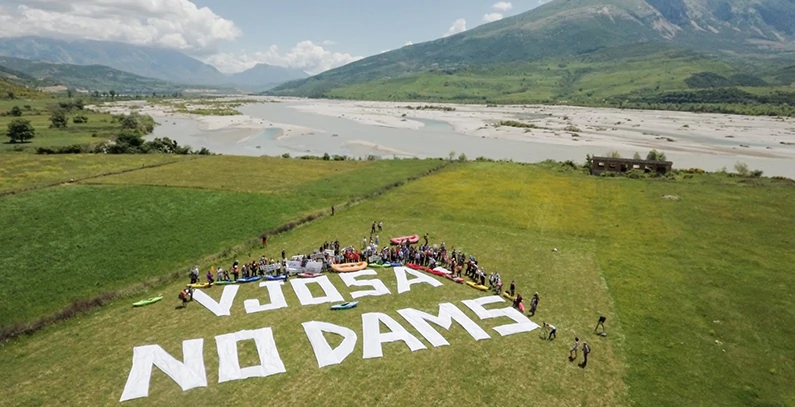1.2.1 Case Study ‘Vjosa River’
Course subject(s)
Module 1. River as ‘Persona’
Case study Vjosa, Albania
Emerging from a nearby mountain gorge, the Vjosa River radiates across the vast gravel expanse below this historic, hill-set town. Its fast-flowing, turquoise waters weave a whimsical web of channels and streams. This is a river that runs where it wants. Our case study for this week is Vjosa, one of the last remaining natural rivers in Europe. It is great example of a river where there is a disconnection between what rivers want and what humans want and how the perspectives of humans on rivers can change over time.
This is what many rivers in central Europe once looked like long ago, before they were polluted, dammed, and fragmented over the last two centuries. Today, more rivers in Europe have been altered and obstructed by man-made barriers than on any other continent. The Vjosa, which flows unimpeded through southern Albania to the Adriatic Sea, is one of the last major European rivers that still runs wild. That makes it the flagship for conservation efforts to protect smaller free-flowing rivers throughout the Balkans, which also remain relatively intact.

Yet the Vjosa, its tributaries, and other Balkan rivers face new threats to their natural flows as officials in the region, which encompasses up to a dozen southeastern European countries, consider proposals to build more than 3,400 new hydropower plants there.
Critics warn that such developments could have devastating ecological consequences for one of Europe’s most biodiverse regions. In addition to more than a dozen new dams planned for the Vjosa River’s main tributaries, oil exploration is ongoing upstream in the Vjosa River Basin and the Albanian government has approved plans for a new airport in the bird-rich Vjosa delta.
In the video below, the impact of dams (and the strong protests) on the Vjosa river will be explained. After that we will focus on morphological and ecological features involved and the responses to the imposed changes.
Local communities and NGO’s (like EcoAlbania) have made efforts to halt the construction of the dams and declare the Vjosa area as a national park. Value of the Vjosa lies the in the pristineness of the area. Researchers are worried that the construction of dams will affect the unique biodiversity that lives in the area of the Vjosa. The following video explains the work of researchers working on the Vjosa river and why it should be protected.
If you are curious and would like to learn more about the Vjosa river, check out the readings below for more information.

Room for Rivers: Perspectives on River Basin Management by TU Delft OpenCourseWare is licensed under a Creative Commons Attribution-NonCommercial-ShareAlike 4.0 International License.
Based on a work at https://online-learning.tudelft.nl/courses/room-for-rivers-perspectives-on-river-basin-management/.



